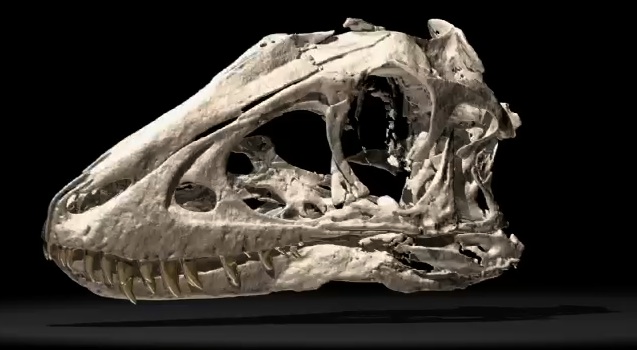We're open daily! View holiday hours
Science News
Young and Deadly T. rex
May 10, 2011

Juvenile Tyrannosaurus rex may not have been as big and strong as their elders, but they were just as deadly, according to a new study.
Looking at a 70 million year-old fossil skull of their closest cousin, Tarbosaurus bataar, researchers determined that young tyrannosaurs had a very different lifestyle than adults.
The skull, found in Mongolia, was part of an almost complete skeleton, missing only the neck and a portion of the tail. Based on careful analysis of the microstructure of the leg bones, co-author Andrew Lee of Midwestern University estimated that the juvenile was only 2 to 3 years old when it died. It was about 9 feet in total length, about 3 feet high at the hip and weighed about 70 pounds. In comparison, Tarbosaurus adults were 35 to 40 feet long, 15 feet high, weighed about 6 tons and probably had a life expectancy of about 25 years.
“This little guy may have been only 2 or 3, but it was no toddler…although it does give new meaning to the phrase ‘terrible twos,’” says Ohio University paleontologist and co-author Lawrence Witmer. “We don't know to what extent its parents were bringing it food, and so it was probably already a pretty capable hunter. Its skull wasn't as strong as the adult’s, and would have had to have been a more careful hunter, using quickness and agility rather than raw power.”
According to lead author Takanobu Tsuihiji of the National Museum of Nature and Science in Tokyo, “The younger animals would have taken smaller prey that they could subdue without risking damage to their skulls, whereas the older animals and adults had progressively stronger skulls that would have allowed taking larger, more dangerous prey.”
Co-author Mahito Watabe also speculates that “the young juvenile Tarbosaurus would have hunted smaller prey, perhaps something like the bony-headed dinosaur Prenocephale.”
“It's one of the secrets of success for tyrannosaurs—the different age groups weren't competing with each other for food because their diets shifted as they grew,” says Witmer.
The study is exciting, reports ScienceNow, because:
Such large dietary differences between a juvenile well past infancy and an adult are rare in the animal kingdom and unprecedented in the world of dinosaurs, the researchers say. If paleontologists didn't know as much as they do about Tarbosaurus, say the authors, they would think this youngster belonged to a separate species.